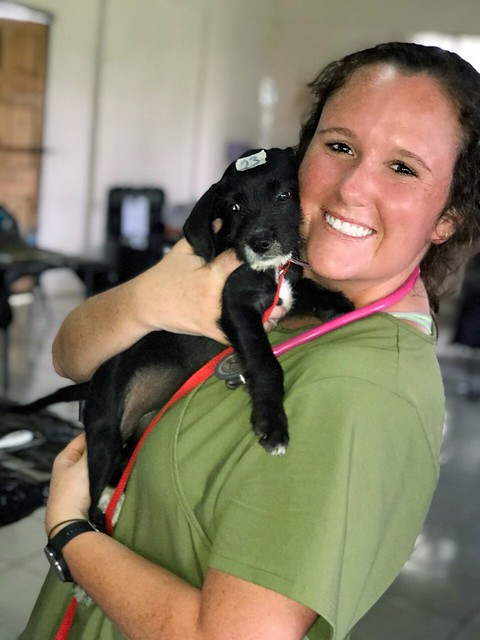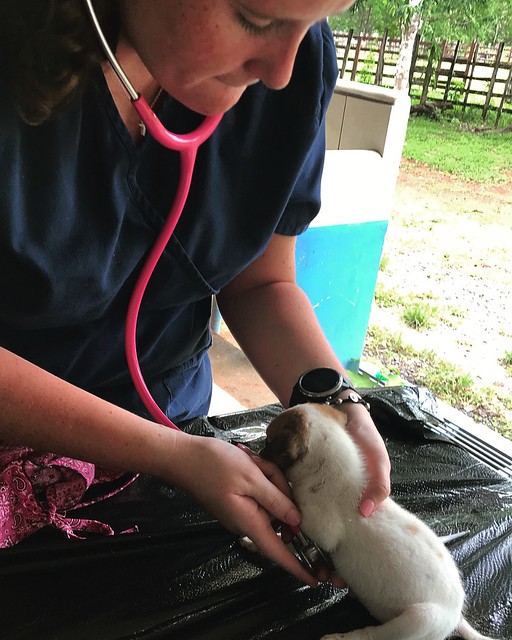Auburn animal sciences students travel to Costa Rica for veterinary medicine service project
Article body
In Guatemala, Nicaragua and Costa Rica, a surplus of abandoned, loose and stray animals is a common and sad sight. Animal overpopulation has left many animals to fend for themselves for food, water and shelter. Many people in these countries, although they want to help, cannot afford veterinary care, leaving many animals emaciated, not only lacking food, but also proper healthcare. Driven by compassion, a group of Auburn University College of Agriculture students, who are studying animal sciences, made it their mission to increase the animals’ quality of life this summer and traveled abroad with The Vida Volunteer Veterinarian Program.
“It’s been an eye-opening experience that really made me stop and think about how blessed I truly am,” said Peyton Ann Mickle, an Auburn student who traveled with Vida to Costa Rica. “This trip taught me the importance of appreciating everything that I have whether it be the food on my plate, the water I drink or the clothes on my back.”
The Vida Volunteer Veterinarian Program helps control animal overpopulation in Central America’s underserved communities at Vida field clinics. The clinics provide consultations and sterilizations in Guatemala and Nicaragua for free, and for $8 in Costa Rica, where laws require veterinarian services be paid.
“People in these communities don’t have money to spend on spaying and neutering their pets,” explained Kara Bowling, another Auburn student on the trip. “This leads to pets rapidly reproducing, causing an overpopulation of strays that are starving and have no one to care for them.”
Auburn’s students gained clinical and practical experience in veterinary medicine through the service trip. Working alongside veterinary surgeons and anesthesiologists, students were instructed on calculating dosages of medicines, administering medicines, inserting catheters, intubating, extubating and monitoring vitals before, during and after surgeries. Although these procedures are quite serious, students felt prepared and confident while gaining hands-on experience because of their classes at Auburn.
“Before each pet was able to go into surgery, we had to conduct a thorough physical exam on them,” explained Bowling. “My classes at Auburn, especially anatomy, were extremely helpful because we learned how to locate and examine certain parts of the pet’s body, such as the lymph nodes.”
Bowling and Mickle learned about Vida’s program from their academic advisors and attended information meetings hosted by Bri Crowe, an Auburn student who previously volunteered with Vida alongside students from other schools. By having experience with the program, Crowe was able to answer questions and provide insight from her own experience. Once students arrived in Costa Rica, they faced some tough realities the informational meetings could not prepare them for.
“Sadly, because the areas we visit are typically so underdeveloped, people aren’t able to provide pets with proper treatment because it is too expensive,” said Mickle. “We had an animal come in that was pretty much terminal and we had no other option but to lay him to rest. Some animals do not survive because treatment for more complicated conditions is too expensive for the pet owners. We always tried our best to do what we could when those more serious cases came up.”
One lucky stray happened to be in the right place at the right time when Vida volunteers noticed a fresh wound on his leg.
“We don’t treat many strays because there’s a lot of paperwork that has to be filled out by owners,” said Bowling. “But there was one specific dog that we treated because we found him wandering around our clinic with a fresh gash on his leg, so we stitched him right up!”
Because of the language barrier, Bowling and Mickle were not able to connect with Costa Ricans as much as they would’ve liked to. However, Mickle explained that because of the volunteers, veterinarians and staff, she is planning to return to Costa Rica next year to continue helping the communities there.
“This trip has given me so much more than I could have ever asked for. I made countless new friends, not only in my major at Auburn, but also globally. Each person holds a very special place in my heart and absolutely changed me for the better,” said Mickle. “The veterinarians and staff are some of the kindest, smartest, funniest and most genuine people I’ve ever met. Without a doubt, I will be returning to Costa Rica this time next year to reunite with my new friends and have the same impact on these communities that we did this trip.”
Related Media
Media interested in this story can contact Communications Director Preston Sparks at (334) 844-9999 or preston.sparks@auburn.edu.
Auburn University is a nationally ranked land grant institution recognized for its commitment to world-class scholarship, interdisciplinary research with an elite, top-tier Carnegie R1 classification, life-changing outreach with Carnegie’s Community Engagement designation and an undergraduate education experience second to none. Auburn is home to more than 30,000 students, and its faculty and research partners collaborate to develop and deliver meaningful scholarship, science and technology-based advancements that meet pressing regional, national and global needs. Auburn’s commitment to active student engagement, professional success and public/private partnership drives a growing reputation for outreach and extension that delivers broad economic, health and societal impact.






